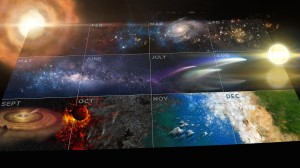
We, as humans, can have difficulty understanding amounts that exceed our narrow perspective. To aid us in understanding the 14 billion years that the universe has existed and the minuscule amount of time humans have inhabited it, scientists have put it in our terms of one year. Each month of the “cosmic calendar” represents roughly 1 million years, which allows us to comprehend the development of the universe. The beginning of the universe, the Big Bang, in this analogy occurred at midnight on January 1st, and our Milky Way galaxy did not form until around February. From there, very little happened that pertained to humans until our equivalent of September (4 and a half billion years ago in reality), when our solar system was formed. By late September, early life on Earth had begun to flourish, and until December, the organisms on Earth were microscopic and primitive. Life recognizable to us did not appear on the scene until mid-December and thus has only been around for a very short period of time in comparison to the age of the universe. The dinosaurs appeared and disappeared yesterday on the cosmic calendar, but in reality, it was 65 million years ago. The early hominids didn’t appear on the cosmic calendar until 9 PM on New Year’s Eve, and the entire ancestry of humans has occurred in the last 30 seconds on that scale. While nearly impossible to fathom, our existence in the span of the universe has been merely a few seconds. The use of the comic calendar helps to show how much has happened within the lifespan of the universe, and it shows us how much further we can go.
I think I disagree with the point you made about the dinosaurs appearing and disappearing in one day. I think in class Dr. G talked about how the dinosaurs actually ruled earth for a couple of days (almost a week?) and this made me think about how little time we humans have actually been atop the food chain. We were born within the last minute, and to imagine us being around for at least as long as they dinosaurs were is really exciting.
LikeLike
Sofia, this blog post is really thought provoking! Usually, demonstrations about the relative brevity of human existence in comparison with the age of the universe serve to highlight the inconsequentiality of our lives. Honestly, though, I think human life is quite consequential. As far as we know, life only exists on earth out of all the possible sources that it could come from in the universe. No other life forms have contacted us in the history of our existence. The fact that life exists at all, even its simplest form, is nearly miraculous. The synthesis of organic molecules hardly seems to have been the obvious next step from the existence of common elements. And, the fact that humans have developed enough to explore the universe and science like we have is remarkable. I think human life is even more consequential than most of us think, despite its brevity and infinitesimally small size.
LikeLike
You’re right, the cosmic calendar is a great way of doing what we humans have to do so often when studying the universe–taking a humongous idea and cramming it into a smaller form we can understand. 🙂 I like your ending note that rather than shrinking us into insignificance, looking at our own short history so far can give us a sense of how much is ahead of us. Together with an appreciation of how hard we have to work to get there, that’s what makes looking out into the universe so rewarding!
LikeLike